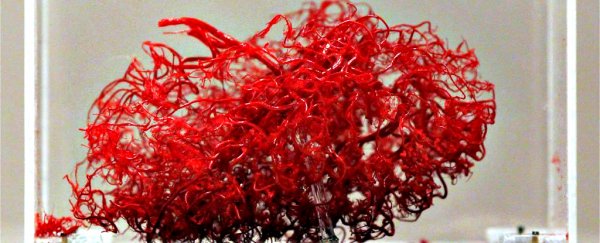Life-saving medicines could soon be sent directly to the brain with just a sniff, thanks to a new nasal spray that uses gold nanoparticles to cross through the blood-brain barrier.
This protective barrier keeps our brains safe from damaging toxins, but also makes it hard for beneficial drugs to be effective – so this nasal mode of delivery could enable all kinds of new treatments.
The spray has been developed by a team from Washington University in St. Louis, who tested it on the antennae of locusts – insects with blood-brain barriers and olfactory networks that are anatomically similar to those in humans.
Based on these tests, the nasal spray method could deliver drugs to the brain in as little as 30 to 60 minutes, according to researchers.
"The shortest and possibly the easiest path to the brain is through your nose," says one of the researchers, Barani Raman.
"Your nose, the olfactory bulb and then olfactory cortex: two relays and you've reached the cortex."
 WUSTL
WUSTL
The researchers developed an aerosol spray made up of gold nanoparticles small enough to pass through the blood-brain barrier. Fluorescent markers were added to track the movement of the nanoparticles.
After exposing locusts to the spray, the nanoparticles moved through the antennas, olfactory nerves, and blood-brain barrier in just a few minutes, before spreading through the brain.
What's more, no noticeable changes were noticed in the olfactory neurons of the locusts after the treatment, suggesting minimal disruption to brain function.
The next stages are to adapt the technique so the gold nanoparticles can carry different types of medicines – and of course to see if the same approach could work with humans in addition to locusts.
If it does, it could be our best option yet for drug delivery to the brain. Pills aren't precise and the medications in them struggle to get through the blood-brain barrier, while injections into the brain are invasive and risk damaging tissue.
The nasal spray is the latest example of how nanotechnology could help improve our health: whether it's fighting cancer or stopping allergies, we're seeing tiny nanoparticles show a lot of potential for treating areas of the body that other drugs struggle to reach.
Thanks to their microscopic size, nanoparticles can be very carefully targeted – as in the case of chemotherapy drugs designed to hit cancer without affecting healthy tissue.
The scientists behind this new study suggest their work could lead to improved treatments for several health problems, including brain tumours, which could be targeted using a combination of a nasal spray and ultrasound.
"This is only a beginning of a cool set of studies that can be performed to make nanoparticle-based drug delivery approaches more principled," says Raman.
The findings have been published in Scientific Reports.
